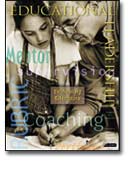Welcome to EL Extra. We have designed questions to help you and your colleagues foster meaningful discussions around this issue of Educational Leadership.
This study guide will not cover all aspects of the issue, but we hope that it will help you generate a conversation around key ideas. Feel free to adapt the questions to be more relevant to your school or school district. Although you can consider many of the questions on your own, we encourage you to use them in pairs, small groups, or even large study groups.
Evaluating Your Evaluation
In “New Trends in Teacher Evaluation” (p. 12), Charlotte Danielson describes strategies to help teachers ensure that all students reach high standards. She outlines the latest evaluation trends: differentiated systems, multiyear cycles, and active teacher roles.
How does your school or district evaluate teachers? Is it a formal or flexible system? Does your evaluation process distinguish between improvement and accountability? Do teachers and supervisors receive evaluation training and guidance? How are other educators, such as administrators, paraprofessionals, and principals, evaluated?
Discuss Danielson’s strategies for evaluation and compare them with your school’s. What problems have you experienced with your current evaluation system? Which of Danielson’s ideas might work in your school or district? Choose one strategy and talk about how you might implement it in your school.
Visions of Good Teaching
In “Appreciating Good Teaching: A Conversation with Lee Shulman” (p. 6), Shulman describes his vision of good teaching. Do you agree with his vision? What would you add? Take a few minutes and jot down your own vision of good teaching. If your school has a mission statement, think about whether and how it aligns with your ideas.
Working from your notes, imagine that you have the task of creating a new evaluation system for your school on the basis of your beliefs. Brainstorm what kinds of evaluation might best measure your vision of good teaching. Would it be linked to student achievement, and, if so, how? Would it involve portfolios, value-added assessments, mentoring, or merit pay incentives? Be specific. What challenges or problems do you foresee?
Merit Pay: The Pros and Cons
Read Al Ramirez’s article, “How Merit Pay Undermines Education” (p. 16). Summarize his arguments against merit pay for educators. Do you agree or disagree? What arguments could you make in favor of merit pay incentives? You may also read Sandra McCollum’s article (p. 21) for the “pro” side. If your discussion group is evenly divided for and against merit pay, get into teams and debate the issue. Read aloud the questions that Ramirez raises on pages 19–20 and discuss them in relation to your school or district.
Who Is Teaching Our Children? You Are!
Who Is Teaching Our Children? You Are!
The May 2001 issue of EL asks “Who Is Teaching Our Children?” We are looking for short (200–300 word) essays explaining who you are and what you do. Be creative, thoughtful, specific, and inspiring. Hardest of all, be brief. Tell us a story about a powerful lesson or provocative moment in your classroom or show us how you influence student learning every day. Why did you become an educator, and what keeps you in the classroom? What about you or your students is unique? Tell us about yourself as an education professional.
We will collect these snapshots of educators—teachers, administrators, principals, paraprofessionals—and publish the best of them in our May 2001 issue. You can e-mail your essays to el@ascd.org, fax them to (703) 575-5400 (care of EL editors), or send them to Carol Tell, 1703 N. Beauregard St., Alexandria, VA 22311. Be sure to include your job title, the name of your school, and your address and phone number. The deadline is March 12, 2001. We look forward to hearing from you.
